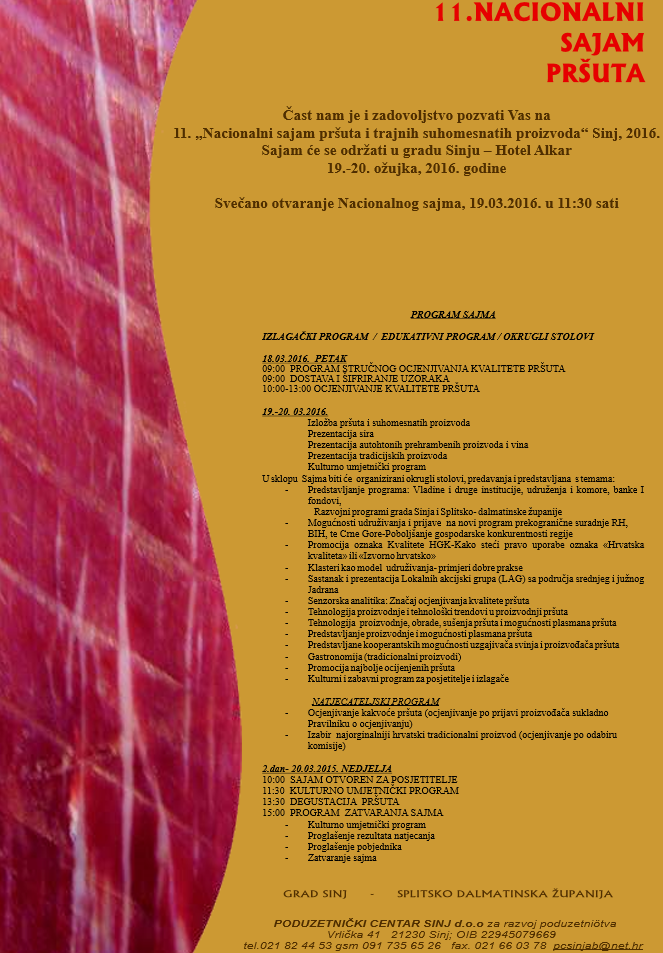Dalmatian Prosciutto Production Could be Threatened by Lack of Bura Winds
January the 14th, 2023 - Dalmatian prosciutto production could well be threatened by higher than normal temperatures and a lack of bura wind, with more and more producers across the Dalmatian hinterland turning towards controlled, artificial methods instead of traditional smokehouses.
As Poslovni Dnevnik writes, due to the unusually high temperatures that unfortunately caused spoilage, a lot of prosciutto was thrown away en masse in the Dalmatian hinterland during the month of December. The first bura winds to arrive finally created some more suitable conditions for Dalmatian prosciutto production, without which it is difficult to imagine any celebration for very many Croats, Dnevnik.hr writes.
An abnormally warm December led to many of those engaged in Dalmatian prosciutto production to simply throw away part of the meat they had already prepared for drying. Salting the prosciutto is done at temperatures of two to eight degrees, otherwise a lot of spoilage occurs. Instead of December, more favourable temperatures for the proper preparation of one of Croatia's favourite delicacies arrived in the hinterland of Dalmatia only with the first bura winds of this winter season.
Because of this lack of reliability, unfortunately more and more manufacturers are having to turn away from traditional methods of preparation and production, replacing their smokehouses with plants which can guarantee controlled conditions, and which are co-financed by the European Union (EU).
"We all work more or less in a traditional way. It's just that we are a little better technically equipped. With these technical possibilities, we have reduced the risks that can arise when unusual weather conditions cause us issues. There can be a little more fat on the meat, or a little less, as far as taste and smell are concerned, there are thankfully no deviations,'' concluded Mijo Zizic from Brstanovo.
For more, make sure to check out our dedicated news section.
Dalmatian Bacon Joins Prosciutto With European Protection
February 16, 2021 – Pršut tends to hog the limelight when people discuss Croatia's mastery of preserving pig, but prosciutto is far from the whole story. Croatian bacon is the best bacon in the world! Having now attained EU-protection, Dalmatian bacon looks set to rightly become the next most famous export of traditional pork produce from the region.
If you've visited Croatia – perhaps, even if you haven't – you'll have tried or at least heard of its famous prosciutto. Known locally as pršut, this dry-cured ham is a renowned delicacy. Taking pride of place at every public buffet, it is served thinly sliced, usually uncooked and savoured simply alongside bread, cheese, wine and olives. It is enthusiastically imported from Croatia across Europe and no less than four Croatian prosciutti from different regions are protected at an EU-level. But, pršut is not the be-all and end-all of Croatia's mastery with preserving pig.
As well as famous sausages like Kulen, kobasica and krvavica, Croatia is also brilliant at making bacon. That's no overstatement. They are not just good at it – Croatian bacon may be the finest you will ever try.
The best bacon made in the country usually come from Dalmatia and Slavonia and is, like Dalmatian prosciutto, smoked. Though Dalmatian bacon may stand slightly in the shadows of the region's more delicate pršut, this more robust and flavoursome product is featured within a greater wealth of traditional, cooked dishes and praised by anyone who tries it.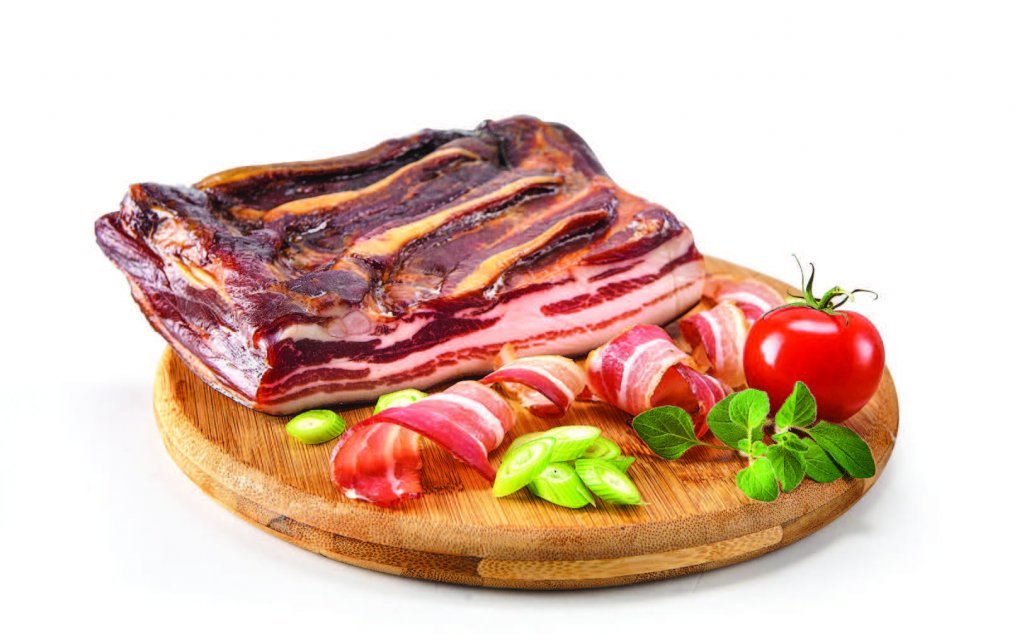 Dalmatian panceta © Gavrilovic
Dalmatian panceta © Gavrilovic
However, the secret of Dalmatian bacon may soon be let out of the bag. This traditionally made product has received the same EU-protection as Dalmatian prosciutto. Sometimes called slanina or panceta (even though, in Italy, the title of pancetta is usually reserved for bacon which is not smoked), Dalmatian bacon was protected at a national level in 2019, the first steps required in order for it to apply for a similar classification within the EU. Confirmation of its EU-awarded protection was announced by the Croatian Agriculture Ministry on Tuesday 16 February 2021
Dalmatian bacon is salted by hand, pressed and smoked. Unlike bacon available in other countries, Dalmatian bacon is only ever that which is elsewhere called 'streaky' bacon, as opposed to 'back bacon'. It is made from pork belly and chest. It has belts of whitish fat running along its length, which carry a substantial amount of flavour. Its traditional salting and smoking process are so thorough that it can be eaten raw, uncooked and is regularly enjoyed in this way.
Dalmatian bacon is aided in its preservation by low winter air temperatures and in its drying by seasonal winds.
Six of the Best! Croatian Protected Produce On Sale in China
September 18, 2020 – Six items of Croatian protected produce are among the 100 European items to go on sale in China
Six items of Croatian protected produce are among the 100 European items to go on sale in China. In a reciprocal deal, 100 Chinese products will also be recognised and recommended on the European market.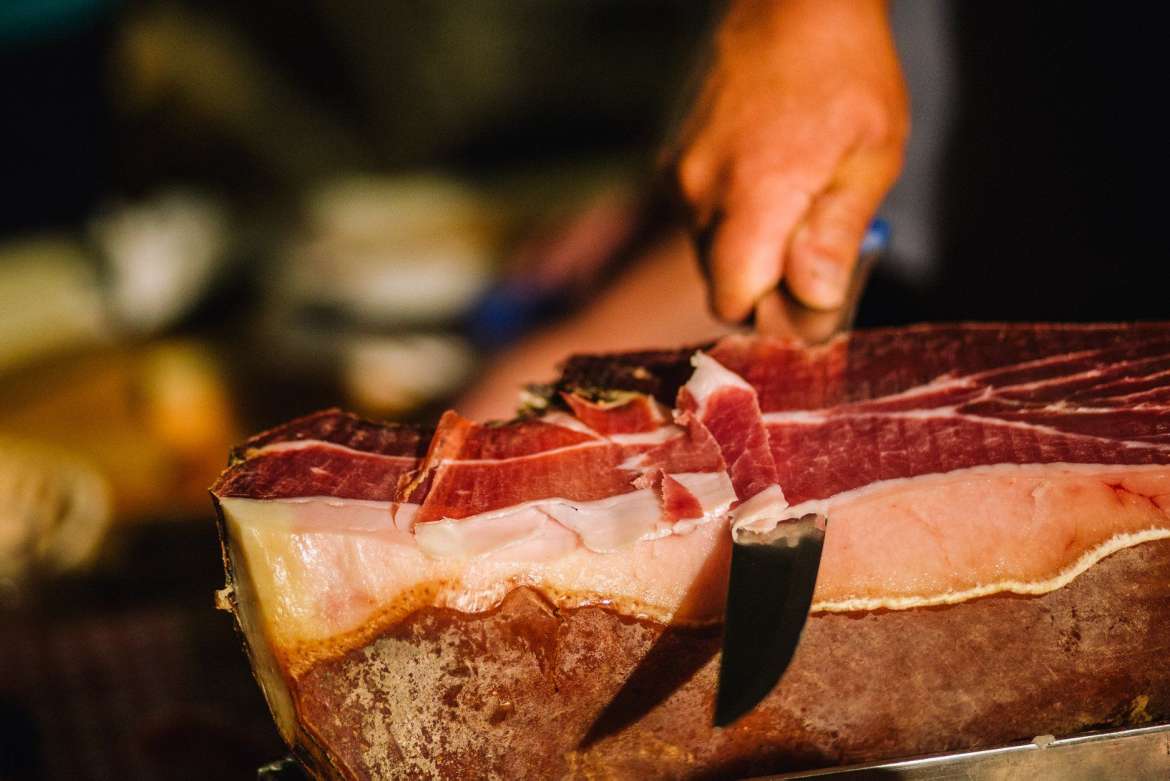 Dalmatian prosciutto © TZ Vrgorac
Dalmatian prosciutto © TZ Vrgorac
Baranja kulen, Dalmatian prosciutto, Drniš prosciutto, Lika potatoes, Dingač wine and Neretva mandarins are the premium six Croatian protected produce chosen to be among the European 100. All of the Croatian protected produce is already recognised at a national and at an EU-level and designated its status based on its unique place of origin.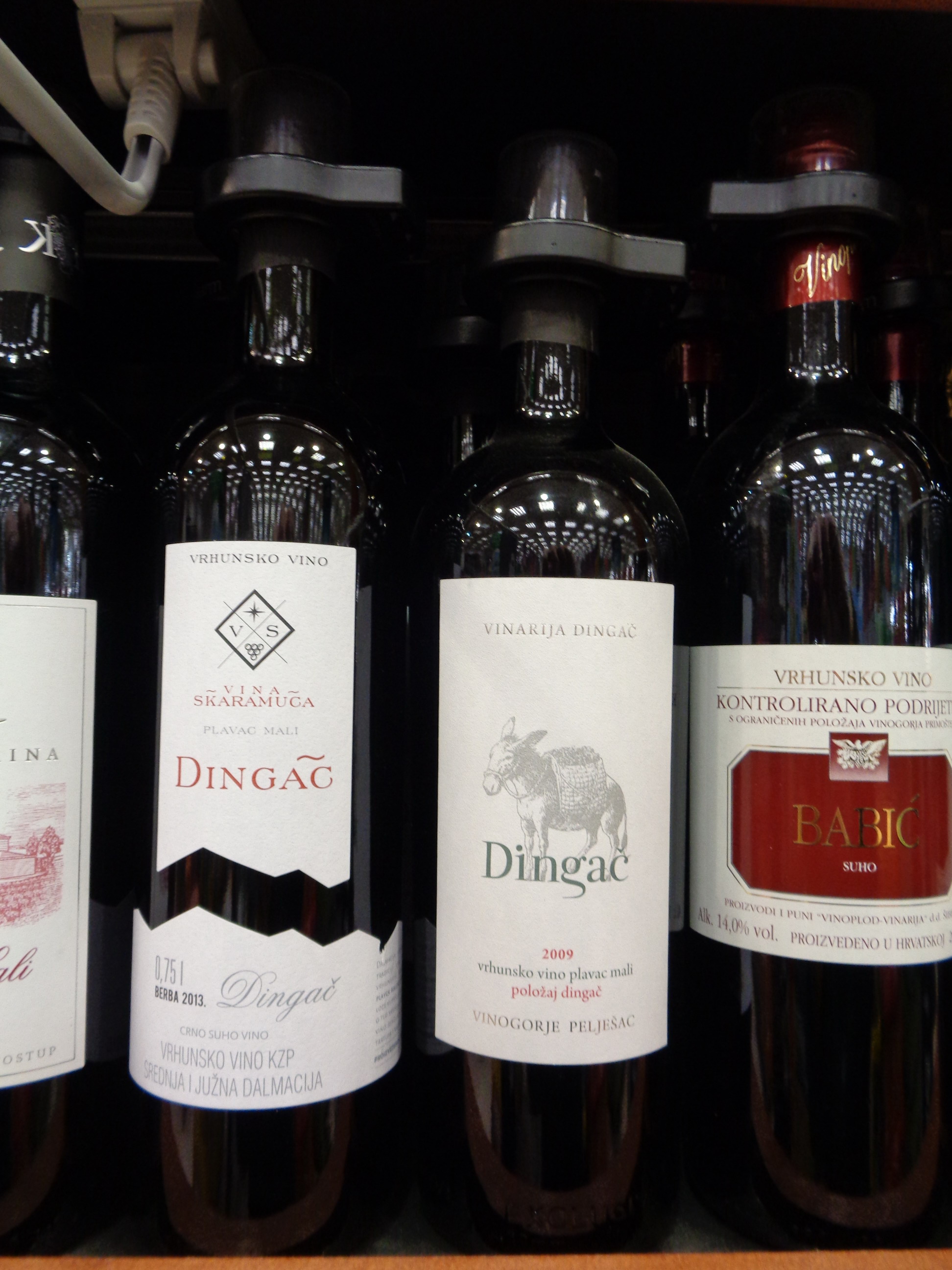 Dingač wine © Silverije
Dingač wine © Silverije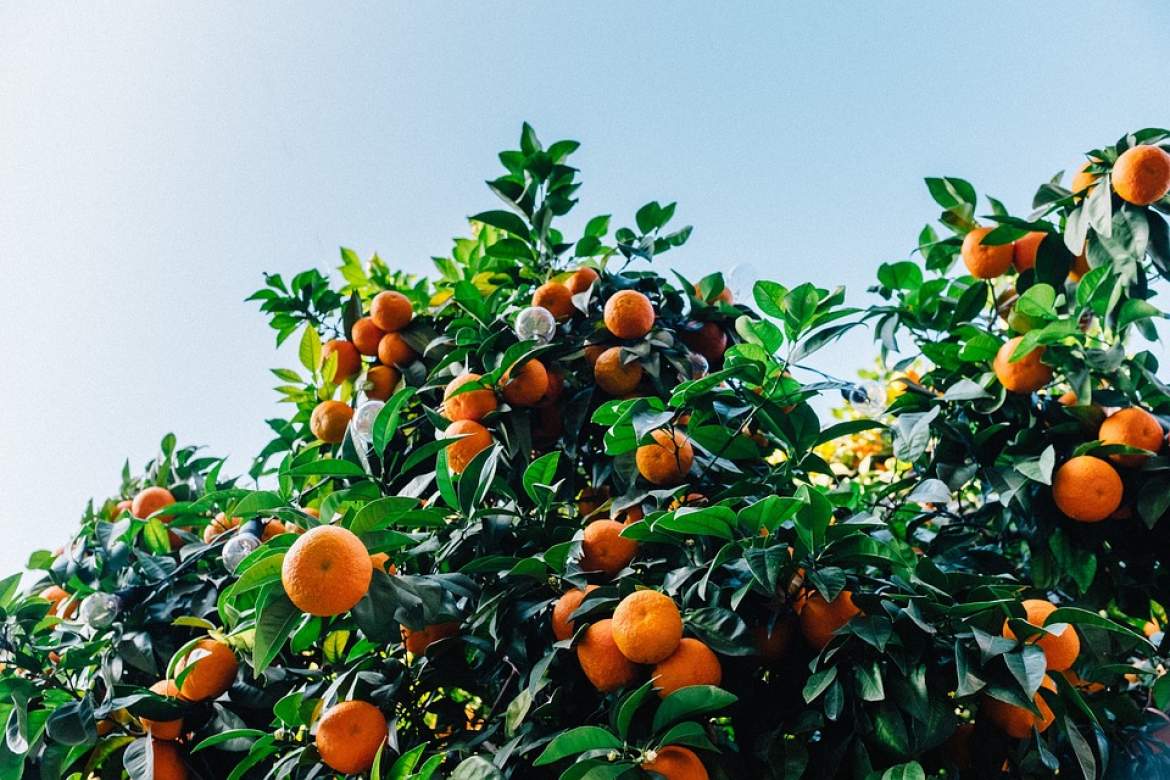 Neretva Mandarins
Neretva Mandarins
The European products will be specially marked and receive special privileges when they go on sale in China. Alongside the Croatian protected produce, other items on the European list are French champagne, Greek feta cheese, Italian Parma prosciutto, Italian mozzarella, Irish whiskey and Portuguese port. On the Chinese list of products are distinct varieties of rice, bean and vegetable products, some of which will already be popular with Europeans who eat or cook Chinese cuisine.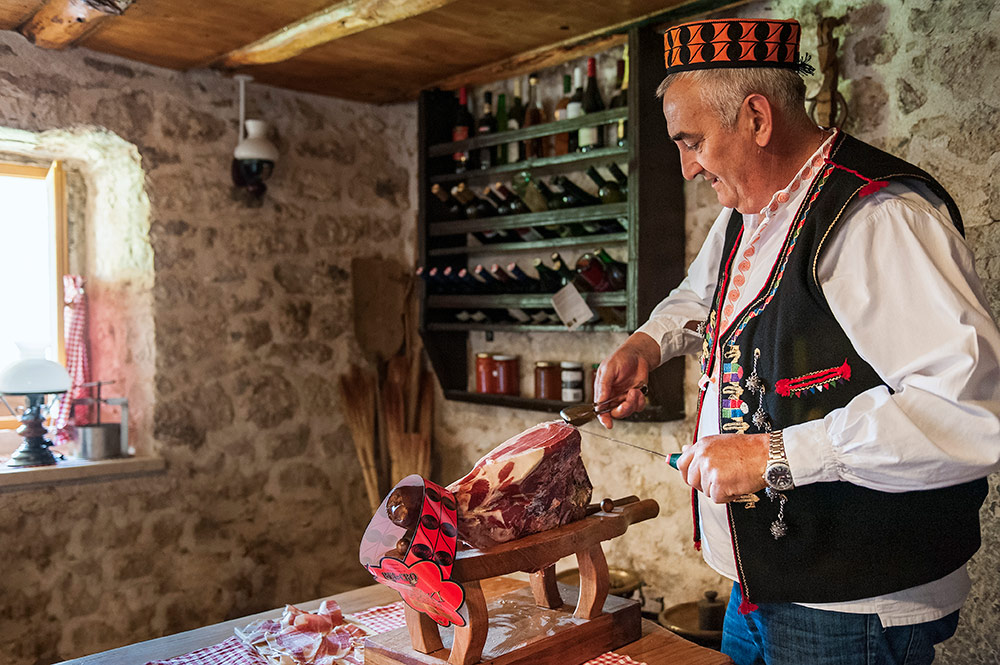 Drniš prosciutto © Tourist Board of Drniš
Drniš prosciutto © Tourist Board of Drniš
The full list of Croatian produce protected at an EU-level currently includes Istrian olive oil, Dalmatian prosciutto, Pag cheese, Lika lamb, Poljički Soparnik, Zagorje turkey, Korčula olive oil, Istrian prosciutto, Sour cabbage from Ogulin, Neretva mandarins, Slavonian honey, Drniš prosciutto, Cres olive oil, Pag salt, Baranja kulen, Bjelovarski kvargl, Varaždin cabbage, Pag lamb, Šolta olive oil, Meso 'z tiblice, Zagorje mlinci, Krk prosciutto, Lika potatoes, Slavonian kulen, Krk olive oil.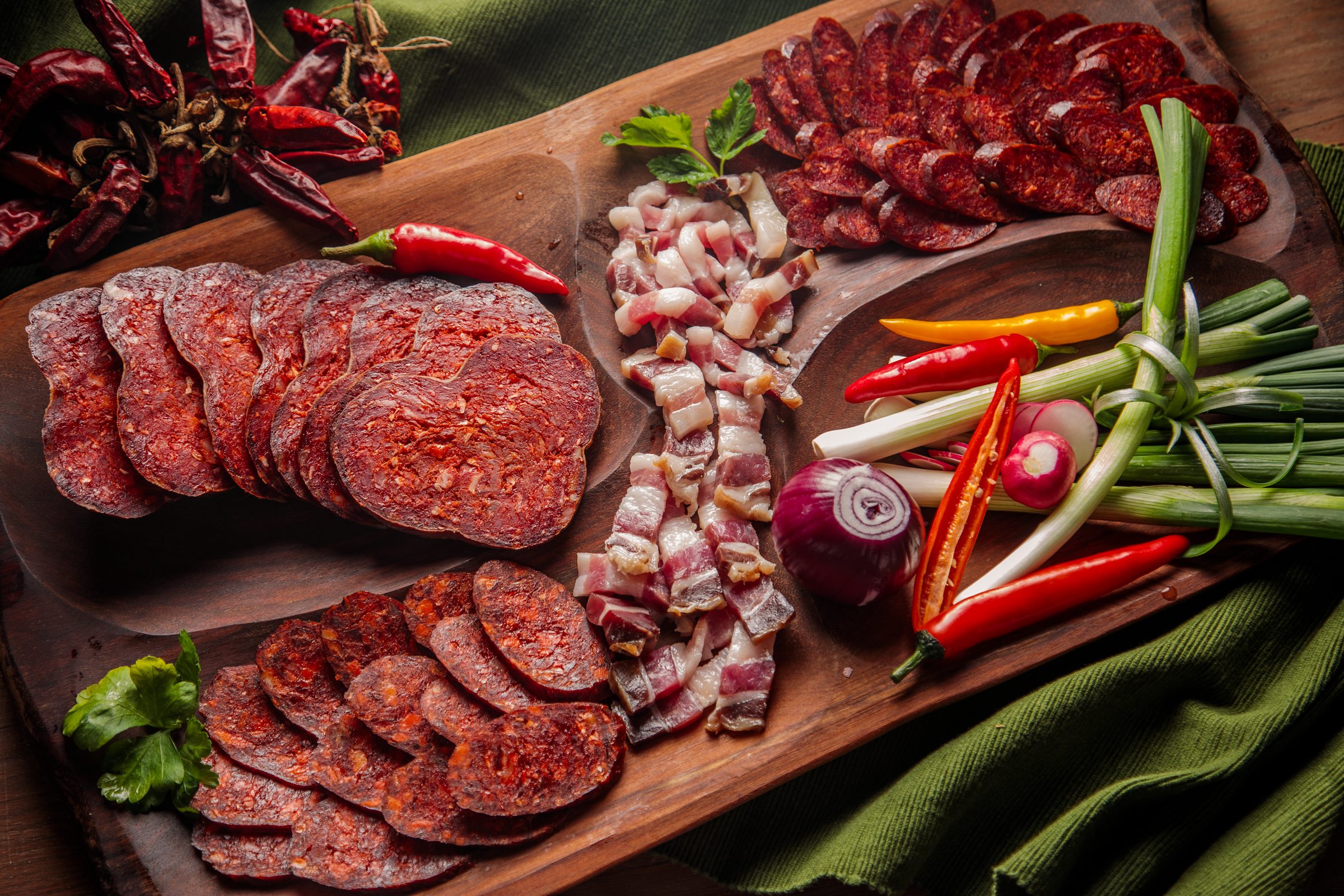 Baranja kulen, featured within a traditional Slavonian platter © Romulić & Stojčić
Baranja kulen, featured within a traditional Slavonian platter © Romulić & Stojčić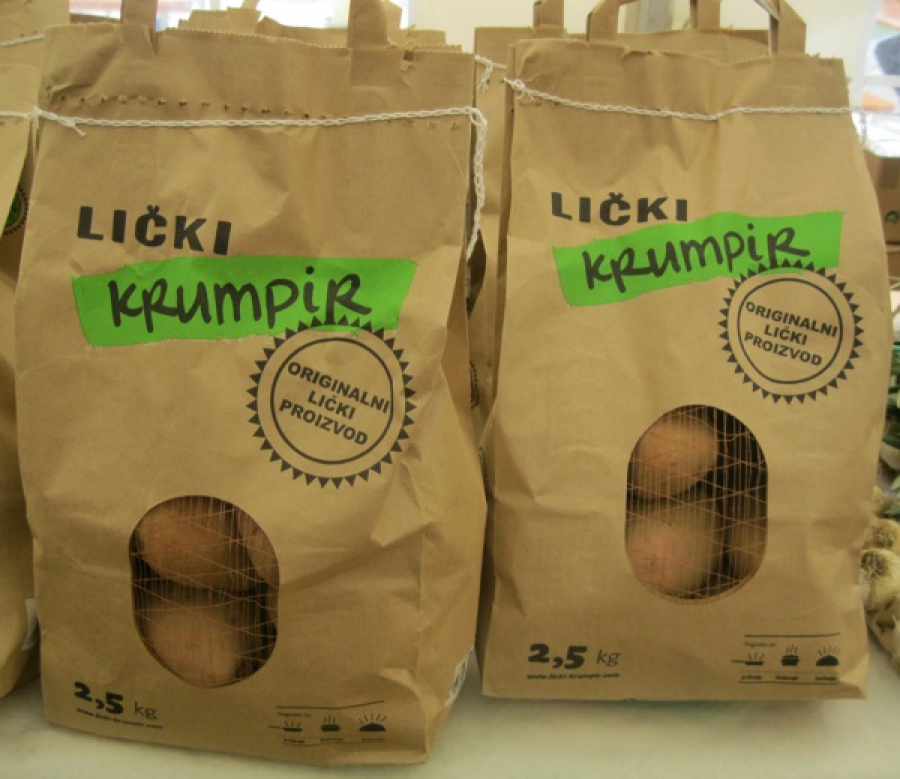 Lika Potatoes
Lika Potatoes
For the latest travel info, bookmark our main travel info article, which is updated daily.
Read the Croatian Travel Update in your language - now available in 24 languages
Big Plans for Croatian Meat Industry and Dalmatian Prosciutto
Big plans are in the works for the Croatian meat industry, more precisely the Pivac company who are going forward with enormous investments near Vrgorac, all in the name of Dalmatia's beloved prosciutto (pršut).
As Poslovni Dnevnik/Sergej Novosel Vuckovic/Marta Duic writes on the 27th of June, 2019, more than seventy percent of the production of certified Dalmatian prosciutto with a protected designation of origin in the EU, comes from the Vrgorac region, and the largest prosciutto production complex in the whole of Southeastern Europe is located in the village of Zavojane.
The owner is the Croatian meat industry's well known Pivac, which is soon set to complete works at a brand new plant located in the nearby economic zone of Ravča.
"Here, traditional forms of production are used just as our grandparents did, only in larger quantities. In addition to prosciutto, we also do pancetta, salami and sirloin. At this location and at this altitude, we're facing towards the wind, and when it comes to Dalmatian prosciutto, the changes of the bura and jugo winds are important,'' explained Darko Markotić, the director of the Pivac meat processing industry during a visit to prosciutto complex in Zavojane. From the 4500 pieces produced back in 2004, this Croatian company has arrived to the production of as many as 150,000 pieces today, and about ten percent of their production is produced from that sole complex in Zavojane.
"The main export markets are Germany, Austria, Switzerland, Serbia, Bulgaria and Hungary," Markotić stated.
In the Ravča zone, in October, a new plant will be opened. In this zone near Vrgorac, there will be a total of nine companies involved in various activities, from the production of car parts and electrics, to laundry.
"The space covers 10,500 square metres and has 300,000 capacity units for prosciutto, where we'll implement all of the modern technology, but we will continue to produce it traditionally," said Markotić.
Investments for the meat industry aren't stopping, because by the end of 2020, they plan to complete a plant for cutting fresh meat and more, as well as new distribution centre covering southern Croatia, and an accompanying administrative building. When this new major investment cycle is over, the new Pivac complex in the aofrementioned economic zone near Vrgorac will cover more than 30,000 square metres, and the value of the total investment will reach a massive thirty million euros.
"It's a private investment, and there's no facility like the one we're getting anywhere else in the world,'' noted the director of this successful Croatian company.
Alongside the aforementioned 300,000 pieces of prosciutto, 2,500 tons of other cured meat products will be stacked and only half a million of them will be processed,'' explains Markotić.
Interestingly, the Croatian company Pivac produces more pancetta than prosciutto on an annual basis, about 2,000 tons of it a year, and in addition to large trade chains, their products are sold in 285 stores. Markotić also pointed out the fact that the key ingredients in Dalmatian prosciutto are salt and smoke, and in natural weather conditions, the prosciutto is dried out for 30-40 days.
The entire process lasts for a minimum of twelve months, and the goods are then usually placed on the market after twelve to twenty months. The prosciutto complex in the village of Zavojane has now expanded, it now employs 25 people with an impressive annual production of 150,000 pieces of prosciutto.
Make sure to follow our dedicated business page for more information on Croatian companies, Croatian products and services, Croatian investments and much more.
'Days of Dalmatian Smoked Ham' Begins in Zagreb
It is the beginning of 'Days of Dalmatian Smoked Ham in Zagreb', a smoked ham filled feast that will last until November 7.
Vrgorac is a Town of the Dalmatian Pršut and Wine!!
It should be an annual, 3-day weekend event, which will pair the traditional culinary values of the hinterland with the authentic rural ambience of the ethno-village Kokorići and the delightful scenery of the Vrbgorac hinterland accompanied by the Dalmatian folklore an other Vrgorac products (honey, chees, bacon, fruits and vegetables).
For more details, follow the Vrgorac tourist board.
Tomorrow Starts the 11th National Pršut Fair in Sinj
You can read the whole article here and be sure not to miss this very tasty event in Sinj this weekend.
The 11th National Pršut Fair in Sinj Soon
Dalmatian Smoked Ham (Pršut) Protected by EU - Try the One from Dugopolje
For a high quality pršut, it is extremely important to have a good pig´s leg, weighing between 14 and 16 kg of fresh meat. Pršut is smoked on dry hornbeam, which has a sweet taste and a little less on beech. Bura (north wind) is very desirable, but not for a long period of time, because it would dry the pršut too much. It is the best, when bura and jugo (south wind) alternate, which is what happens the most in our area," said Vlade Prančić.


